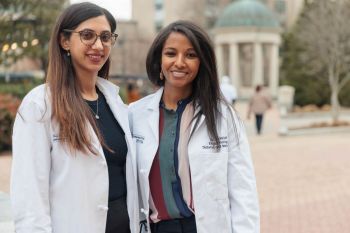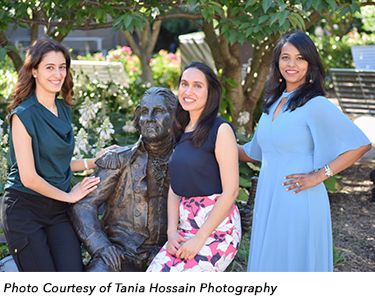
Welcome to the George Washington University Endocrinology, Diabetes, and Metabolism Fellowship Training Program. Located in Washington, D.C., our program draws upon the diverse training of both the George Washington University and the Veteran’s Affairs Medical Center (VAMC). View the “Day in the Life of a Fellow” videos for a glimpse of what our fellows do at GW and the VA during their fellowship. Also visit the Structure tab to learn more about the program. Additionally, our fellows rotate at both Children’s National Hospital and the National Institutes of Health in the second year of fellowship. The breadth of cases seen in this fellowship leads our fellows to have broad exposure to endocrinological disorders, both common and rare. Upon graduation, our fellows are clinically astute and ready to enter academic, community, or private practice.
Overview

The two-year training program enables trainees to develop the clinical competence and procedural skills necessary in order to practice endocrinology independently. In addition, fellowship provides an opportunity for trainees to develop their teaching skills, clinical and laboratory research skills, and personal educational skills that will prepare them for continuing professional growth after formal training has been completed.
The goals, content, and evaluation processes of the program are governed by the requirements of the American Board of Internal Medicine (ABIM) and the Accreditation Council for Graduate Medical Education (ACGME). Satisfactory completion of the training program fulfills the requirements for entrance to the certifying exam in Endocrinology, Diabetes and Metabolism administered by the ABIM.
Program Goals
The endocrinology fellowship program at George Washington University and the VA Medical Center aims for its trainees to develop:
- An understanding of basic endocrine physiology. The trainee should understand normal endocrine molecular biology, biochemistry and physiology, and be able to apply those concepts to understand endocrine disease mechanisms.
- A thorough knowledge of the approach to the evaluation and diagnosis of patients presenting with endocrine disorders and complaints.
- An understanding of treatment and management strategies for endocrine disorders.
- Technical skills to perform thyroid ultrasound and fine needle aspiration (FNA) biopsy, dynamic testing, insulin pump therapy, continuous glucose monitoring, DXA interpretation and other skills needed for endocrine practice.
- The ability to interpret diagnostic studies, including hormonal testing and imaging studies.
- Skill in the planning, performance and presentation of clinical, translational and laboratory research in endocrinology and metabolism.
- Skills to design, initiate and perform Quality Improvement projects related to clinical endocrinology.
- Skills in educating physicians, other health care professionals, patients, and lay persons about endocrine disease.
Clinical Training
The fellowship program is structured such that medical knowledge and skills pertaining to endocrine and metabolic diseases are acquired through supervised clinical experiences and formal education.
Clinical competence is developed through a structured system of learning from patients with endocrine diseases and from formal and informal didactic sessions. The clinical education program is based upon several concepts:
- Trainees are primarily in the program to learn
- Gradually progressive responsibility for patient care is an important part of learning.
- Attending physicians are responsible for the quality of patient care and the teaching process.
- Patient contacts must be numerous and varied. They include inpatients and outpatients with as much variety as the institution can provide.
- Continuity of care is a valuable learning tool.
- Teaching conducted by trainees is a valuable learning tool.
Our alumni graduates have gone on to successful careers in various positions throughout the United States and the world (see the Fellows tab to see where our fellows have gone next).
Thank you for your interest in our program. Please do not hesitate to contact us with any questions.
Rasha Haykal, MD
Fellowship Program Director
Endocrinology, Diabetes, and Metabolism
George Washington University
imfellowships [at] gwu [dot] edu (imfellowships[at]gwu[dot]edu)
Nadine El-Asmar
Chief of Endocrinology
Endocrinology, Diabetes, and Metabolism
George Washington University
Application Process
Application Information
Applications are only accepted through the Electronic Residency Applications Service (ERAS).
The candidate must register for both ERAS and the National Residency Match Program (NRMP). A candidate who has not registered with the NRMP cannot be considered during the ranking process. It is very important to remember to register.
Requirements for GW Fellowships
Fellowship applicants must have completed three years in an ACGME-Accredited Internal Medicine Residency, and be board-certified or board-eligible.
Required Documents for Complete myERAS Application
- myERAS application
- Curriculum Vitae (CV)
- Personal Statement
- Three Letters of Recommendation (one from the program director)
- USMLE / COMLEX Scores (must have passed Steps I-III prior to start of fellowship year)
- Medical Student Performance Evaluation (MSPE)
- ECFMG Status Report for International Medical Graduates (must have certification)
- Licensing Information and Board-Eligibility/Certifications (if applicable)
- Citizenship Status
International Medical Graduates
We can only consider applicants with J1 visas. Please see our GME Visa policy.
IMGs must have completed an ACGME-accredited residency program.
Graduates of International Medical Schools must also be certified by the Educational Commission for Foreign Medical Graduates (ECFMG).
If you have any questions, please contact Lisa Horvath at 202.677.6056 or imfellowships [at] gwu [dot] edu (imfellowships[at]gwu[dot]edu).
Virtual Tour: Endocrinology & Metabolism Fellowship
Thank you for your interest in our Endocrinology, Diabetes, & Metabolism fellowship program. We are thrilled to offer you this virtual tour as an opportunity to see and learn more about the facilities and resources available to our fellows.
Program Structure
Year One
The first year of the endocrine fellowship emphasizes the pathophysiology of endocrine disorders, structured overview of endocrine and metabolic diseases, and progressive improvement of clinical skills including history, physical examination, the diagnostic evaluation, and the therapy of these disorders. During this year, fellows are introduced to endocrine procedures including sonography of the neck, fine needle aspiration of thyroid lesions, stimulation and suppression testing, insulin pump therapy and using continuous glucose monitoring devices.
Fellows are expected to become familiar with the major endocrine literature, to become skilled in searching the published medical literature and to become proficient in analyzing articles in order to extract and summarize methods and results, and critique the major findings and conclusions.
During their first year, fellows are expected to choose a faculty mentor and initiate their research and quality improvement projects. One month of the first year is devoted to initiation of research as well an elective.
Year Two
The major clinical goal of the second year is to prepare fellows to be independent practitioners. To that end, senior fellows are given increasing responsibilities. They are expected to master the clinical skills that were introduced during their first year of fellowship. They are expected to progress in their teaching skills and improve their own lecture skills. They are expected to teach the junior fellows, as well as the residents and students who rotate through the endocrinology service.
-
Second-year fellows spend one month at Children’s National Hospital. The goal of the rotation is to see children and adolescents with endocrinologic and metabolic disorders, learning how to care for them and transition care into adulthood. Fellows take part in the outpatient clinics there as well as didactics. Additionally, one week is spent on the inpatient service.
-
Second-year fellows spend one month at the National Institutes of Health, National Institute of Diabetes, Digestive, and Kidney Disease (NIDDK) inpatient service. Goals of the rotation are to identify, work on and diagnose rarer endocrinological disease and treatment in a specialty research center. Fellows will be exposed to rare and non-rare endocrinological disorders and become familiar with the inpatient research protocols at the NIDDK. Fellows will participate in all didactics and presentations at NIDDK while on the rotation.
Rotation Schedule
The rotation schedule is based on 5 fellows.
| Year One | |
|---|---|
| Veterans’ Affairs Medical Center (VAMC) | 5 months |
| George Washington University School of Medicine and Health Sciences (GW) | 5 months |
| Clinical/Research Elective | 1 month |
| Vacation | 4 weeks |
| Year Two | |
|---|---|
| Veterans Affairs Medical Center (VAMC) | 4 months |
| George Washington University School of Medicine and Health Sciences (GW) | 3 months |
| Pediatric Endocrinology at Children’s National Hospital | 1 month |
| Clinical Elective/Research Elective | 2 months |
| Vacation | 4 weeks |
| National Institutes of Health (NIH) | 1 month |
Fellows and Alumni
Current Fellows | 2023-2025
Jessica Khoury, MD
Medicine Residency: Roger Williams Medical Center - Boston University School of Medicine
Aisha Parihar, MD
Medicine Residency: WellSpan Health York Hospital (Pennsylvania)
Ward Althunibat, MD
Laurence Aoun, MD
Fidini Antoni, MD
Feryal Mousavi, MD
Alumni Fellows
2024
Layal Esper, MD
Medicine Residency: Seton Hall University - Englewood Hospital (New Jersey)
Post-Residency: Hospitalist, Catholic Medical Center (New Hampshire)
Amira Ibrahim, MBBCh
Medicine Residency: Florida Atlantic University
2023
Kelly Le, MD
Medicine Residency: Greater Baltimore Medical Center
2022
Nejat Naser, MD
Medicine Residency: The George Washington University
Post-Residency: Hospitalist, Kaiser Permanente (Washington, DC)
Post-Fellowship position: Endocrinologist, Kaiser Permanente (Washington, DC)
Hira Shakeel, MBBS
Medicine Residency: Greater Baltimore Medical Center
Post-Fellowship position: Endocrinologist, Bayhealth Hospital, Kent Campus (Dover, DL)
2021
Surosh Nazeer, MD
Medicine Residency: University of Maryland, Prince George’s County Medical Center
Post-Fellowship position: Endocrinologist, Greenway Endocrinology (Greenbelt, MD)
Maryam Movassaghian, MD
Medicine Residency: Greater Baltimore Medical Center
Fellowship: Geriatrics at University of Maryland
Post-Fellowship position: Endocrinologist at MedStar Montgomery Medical Center (Olney, MD)
2020
Farah AlSarraf, MD
Medicine Residency: University of Utah
Fellowship: Metabolic Bone Disease at McMaster University (Canada)
Harleen Dehal, MD
Medicine Residency: Sinai Hospital, Baltimore
Post-fellowship position: Endocrinologist at Eastern Maine Medical Center
Preethi Padmanaban, MD
Medicine Residency: St. Elizabeth’s Hospital
Fellowship: Geriatrics at George Washington University
Post-fellowship position: Endocrinologist at Hamilton Medical Center (Dalton, GA)
2019
Munaza Akunjee, MD
Medicine Residency: Providence Hospital
Post-fellowship position: Endocrinologist at Washington Hospital Center
Sasan Fazeli, MD
Medicine Residency: Providence Hospital
Post-fellowship position: Oncological Endocrinologist at City of Hope (Duarte, CA)
2018
Sana Akbar, MD
Medicine Residency: University of Tennessee
Post-fellowship position: Endocrinologist at Greenway Endocrinology (Greenbelt, MD)
Amani Alameer, MD
Medicine Residency: George Washington University
Post-fellowship position: Endocrinologist at Medstar, St. Mary’s
Enas AlZaghal, MD
Medicine Residency: University of Arizona
Post-fellowship position: Endocrinologist at University of Nebraska affiliate
2017
Preethi Kadambi, MD
Medicine Residency: Howard University
Current position: Endocrinologist at University of Maryland, Baltimore Washington Medical Center
Sheliza Lalani, MD
Medicine Residency: George Washington University
Current position: Endocrinologist at Bayly Medical Clinic, Toronto, Ontario, Canada
2016
Naima AlFaraj, MD
Current Position: Consultant Endocrinologist, Dr. Sulaiman Al Habib Medical Group, Al Zahra General Hospital (Qatif, Saudi Arabia)
Kriti Gupta, MD
Current Position: Endocrinologist, Baylor, Scott, & White Health (TX)
Resmi Premji, MD
Current Position: Endocrinologist, Montage Medical Group, Marina, CA
2015
Jamil Addas, MD
Current Position: Consultant Endocrinologist, International Medical Center (Jeddah, Saudi Arabia)
Ishita Prakash, MD
Current Position: Endocrinologist, Pierremont Endocrine Center, Shreveport, Louisiana
Nira Roopnarinesingh, MD
Current Position: Endocrinologist, Division of Endocrinology, Albany Medical Center
2014
Shruti Gandhi, MD
Current Position: Endocrinologist, Veteran’s Affairs Medical Center
Assistant Professor of Medicine, George Washington University School of Medicine, Washington, DC
Catherine Luz Tello, MD
Current Position: Endocrinologist, Food and Drug Administration (Washington, DC)
2013
Hawaa Al Mansouri, MD
Current Position: Deputy Director, Imperial College of London Diabetes Center, Abu Dhabi, United Arab Emirates
Tanu Chandra, MD
Current Position: Endocrinologist, Atrium Health at NorthEast Endocrinology – Monroe (Monroe, NC)
David Ni, MD
Current Position: Endocrinologist, Maryland Endocrine, Columbia, Maryland
2012
Manchin Chang, MD
Current Position(s): Endocrinologist, Diabetes and Endocrinology Associates | Clinical Assistant Professor of Medicine, Brown University Alpert School of Medicine, Providence, Rhode Island
Adline Ghazi, MD
Current Position: Endocrinologist, Diabetes and Endocrine Center, Director of Diabetes Care, Good Samaritan Hospital (Baltimore, MD)
2011
Khalid Alswat, MD
Current Position(s): Vice President of Graduate Studies and Scientific Research, Professor of Medicine; Internal Medicine, Diabetes and Endocrinology Consultant; Certified Clinical Densitometrist, Department of Medicine, Taif University School of Medicine (Taif, Saudi Arabia)
Jeffrey Mindel, MD
Current Position: Endocrinologist, Bay West Endocrinology Associates, Baltimore, Maryland
Jonathan Welden, MD
Current Position: Endocrinologist, The Baton Rouge Clinic AMC, Baton Rouge, Louisiana